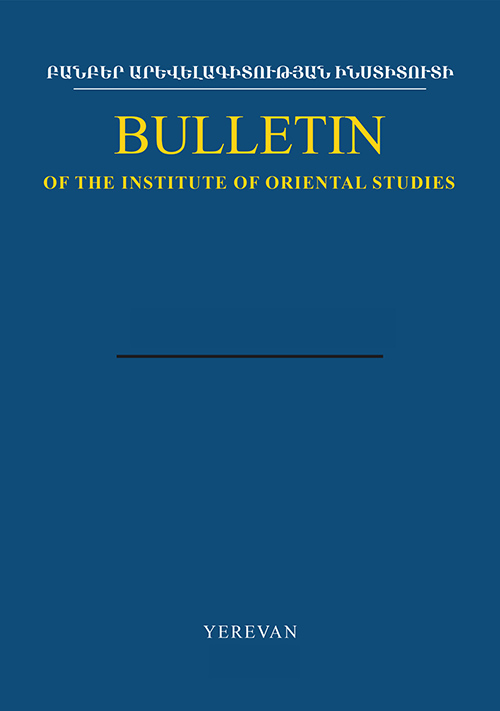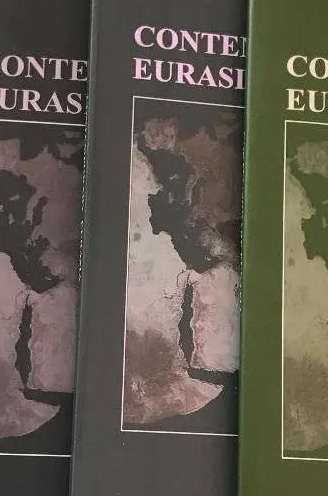
Yeva Harutyunyan
| Position | |
| Scientific degree | Candidate of Historical Sciences |
Education
| Post-doctoral |
Areas of researches/ Research Interests
| Japan’s Middle Eastern policy |
| Japan’s policy in Central and Western Asia states |
| Japan’s energy and securtiy policy |
Professional activity
| Since 2007 until now senior researcher of the Institute of Oriental Studies of National Academy of Sciences |
| 2015-2017 - lecturer in Russian - Armenian (Slavonic) University |
Awards, Prizes, Scholarships
| In 2012 I received a scholarship from the Japanese Foundation to participate in the two-month course "For specialists in cultural and academic fields", Japan, Osaka, Kansai Japanese language institute. |
| In 2017-2018, I received a scholarship from the Japanese Foundation as a visiting researcher to conduct my postdoctoral research in Kobe University. |
Participation in conferences
| 1. Japan-Iran relations during the second oil crisis, Young orientalists conference, Yerevan, 2009. |
| 2. On cooperation between Japan and Kuwait, Young orientalists conference, Yerevan, 2010. |
| 3. Japan’s cooperation with the states of the Gulf Cooperation Council (1981–1991), Young Orientalists of Commonwealth countries Independent States, 2010. |
| 4. The third oil crisis as a result of the Iran-Iraq war and Japan's role in conflict resolution, Young orientalists conference, Yerevan, 2011. |
| 5. The geopolitical preconditions for the establishment of Gulf Cooperation Council (Геополитические предпосылки создания Совета Сотрудничества Арабских Государств Персидского залива), International conference, Donetsk, Ukraine, 2013. |
| 6. The issues of securing Japan's oil sea lanes communication, Moscow, Institute of Oriental studies of Russia, 2013. |
| 7. The third oil crisis as a result of the Iran-Iraq war and Japan's role in conflict resolution, Young orientalists conference, Yerevan, 2014. |
| 8. Japanese civilization and the modernization process, Questions of political science “Huntington and the Modern Political Discourse” conference, Yerevan, 2014. |
| 9. The activation of the military-political role of Japan after the end of the "Cold war", «EX ORIENT LUX, Change of worldview paradigm from eurocentrism to universalism, Yerevan, 20-21 June, 2016. |
| 10. Japan’s position on the Syrian crisis, International conference “The crisis of the Syrian refugees from regional to global challenges”, Yerevan, September 2, 2019. |
| 11. Japan's Middle Eastern policy after the adoption of Security laws in 2015, Conference dedicated to the 50th anniversary of the Institute of Oriental Studies of National Academy of Sciences of the Republic of Armenia, Yerevan, 2021. |
| 12. The Japanese economic "miracle" and the main principles of Japan's security policy formatted since the Second World War, Seminar during the summer school named “Secrets of the East”, Yerevan, 2021. |
| 13. History of the Second World War in the schools of Japan, International conference “Tragic pages of European history: the resistance movement and collaboration with Nazi Germany during the Second World War”, Moscow, September 21-22, 2022. |
| 14. Japan’s policy in the South Caucasus (1992-2022), International conference devoted to historian’s day “Civilizations and wars”, Yerevan, YSU, December 1-2, 2022. |
Professional unions
| Member of scientific council of the Institute of Oriental Studies of NAS, RA |
List of published books
| Harutyunyan Yeva, “Japanese policy in the region of Persian Gulf and the Gulf Cooperation Council (1981-2011)”, Yerevan: “Gitutyun” publishing house, 2016, p. 236. |
List of published articles
| 1. | Japan’s policy in some Middle Eastern states during 1973’s oil crises, Journal of Middle East: History, policy, culture, vol. V, Yerevan, 2008, 87-93 (in Armenian, with Russian and English summaries). |
| 2. | Japan’s energy diplomacy in the states of Perisan Gulf in the context of three oil crises (Энергетическая дипломатия Японии в странах Персидского залива в контексте трех нефтяных кризисов), “Yaponia" yearbook, 2008, 37, 52-67 (in Russian). |
| 3. | Japan-Iran relations during the second oil crisis, Journal of Middle East: History, policy, culture, vol. 6, Yerevan, 2009, 124-133 (in Armenian, with Russian and English summaries). |
| 4. | Japan-iranian relations during the second oil crisis (1979-1981թթ.), Journal of Eastern Asian studies, vol. I, Yerevan, 2009, 137-149 (in Armenian, with Russian and English summaries). |
| 5. | Japan’s cooperation with the states of Gulf Cooperation Council (1981-1991) (Сотрудничество Японии со странами Совета сотрудничества арабских государств Персидского залива (1981–1991 гг.), Collection of young orientalists of CIS, Moscow, 2010, 44-46 (in Russian). |
| 6. | The formation of Japan's new Middle Eastern policy and approach during the Post-Cold war period (1991-2001), Journal of Eastern Asian studies, vol. II, Yerevan, 2009, 104-113 (in Armenian, with Russian and English summaries). |
| 7. | On cooperation between Japan and Kuwait, Journal of Middle East: History, policy, culture, vol. VII, Yerevan, 2011, 159-169 (in Armenian, with Russian and English summaries). |
| 8. | The geopolitical preconditions for the establishment of Gulf Cooperation Council (Геополитические предпосылки создания Совета Сотрудничества Арабских Государств Персидского залива), Preceedings of XXXII international scientific-practical conference, Donetsk, Ukraine, 2013, 55-57 (in Russian). |
| 9. | The activation of Japan's military-political role in the Persian Gulf region and the security issues of "sea lanes" communication after the events of September 11, 2001, Journal of Countries and peoples of the Near and Middle East, Vol. XXIX, Yerevan, 2014, 261-275 (in Armenian). |
| 10. | The third oil crisis as a result of the Iran-Iraq war and Japan's role in conflict resolution, Journal of Middle East: History, policy, culture, vol. IX, Yerevan, 2014, 439-451 (in Armenian, with Russian and English summaries). |
| 11. | The issues of security of Japan's oil sea lanes communication (Проблема обеспечения безопасности нефтяных морских путей Японии), Preceedings of international conference “Japan in Asia: Situation and perspectives of regional relations”, Moscow, 2014, 105-114 (in Russian). |
| 12. | Japanese civilization and the modernization process. Questions of political science “Huntington and the Modern Political Discourse”, Proceedings of the Fourth Republican Conference on Political Science, Yerevan, 2015, 113-123 (in Armenian). |
| 13. | Japan's policy in the Persian Gulf region during the Iran-Iraq war and the Iraq-Kuwait conflict (Политика Японии в регионе Персидского залива в период ирано-иракской войны и ирако-кувейтского конфликта), “Yaponia" yearbook, Vol. 44, Moscow, 2015, 57-65 (in Russian). |
| 14. | Japan’s economic relations with Saudi Arabia, Journal Contemporary Eurasia, Vol. V (1), 2016, 34-43 (in Armenian). |
| 15. | The activation of the military-political role of Japan after the end of the "Cold war" (Активизация военно-политической роли Японии после окончания "холодной войны"), «EX ORIENT LUX, Change of worldview paradigm from eurocentrism to universalism, Yerevan, 2017, 135-152 (in Russian). |
| 16. | On Japan - Qatar relations, Journal of Eastern Asian studies, vol. III, Yerevan, 2018, 62-75 (in Armenian). |
| 17. | Japan's political and economic strategy in Central Asia, Journal of Contemporary Eurasia, 2020, IX (1), 25-39. |
| 18. | Japan’s energy policy in the Central Asian region, Journal of Eastern Asian studies, vol. IV, Yerevan, 2020, 83-101 (with Armenian summary). |
| 19. | Japan’s economic policy in Armenia (1992-2021), Bulletin of the Institute of Oriental Studies, Yerevan, 2021, Vol. 1 (34), 165-184 (in Armenian). |
| 20. | History of the Second World War in the schools of Japan, “Tragic pages of European history: the resistance movement and collaboration with Nazi Germany during the Second World War”, Moscow, 2022, 38-44 (in Russian). |
| 21. | The role of Japan in supporting Armenians and developing a number of sectors of Armenia's economy, Journal History and Culture, Yerevan, 2022, Vol. 1(17), 101-117 (in Armenian with English summary). |
| 22. | JICA’s activities in Armenia and Azerbaijan (comparative analysis)), Journal of Eastern Asian studies, Proceedings of the conference “Armenia- Japan: Past, present and the perspectives of future, Vol. V, Yerevan, 2022, 88-107. |


